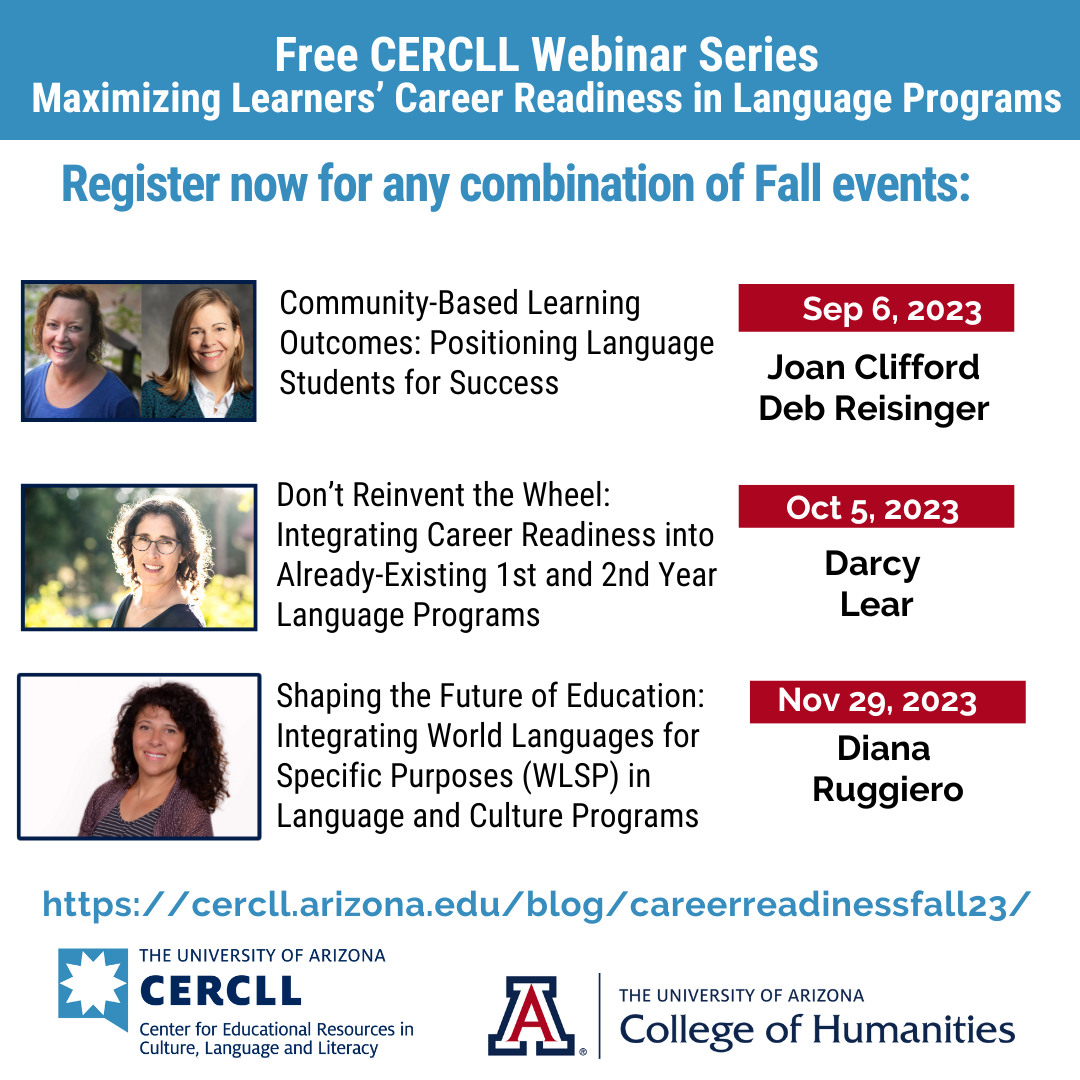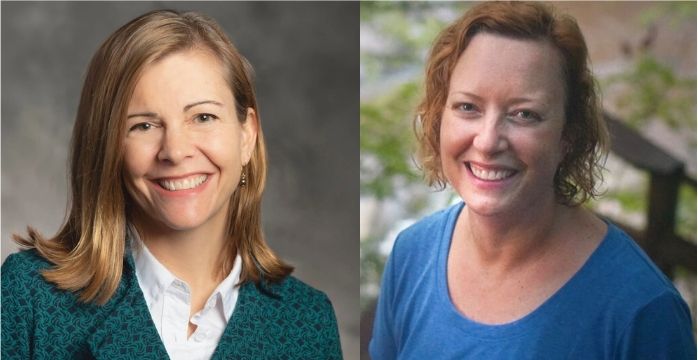
Each year, CERCLL hosts one or more series of professional learning webinars for language educators, with topics selected from among requests that we have received from participants in our previous professional development events. This Fall, the series focuses on career-focused language development. In 2019, ACTFL’s Making Languages Our Business report revealed the high and growing demand for language skills in the workplace with 9 out of 10 employers surveyed citing a reliance on bilingual employees and 1 in 3 reporting a language skills gap. Curricular offerings of language programs are not always balanced in a way that prioritizes the kinds of skills, knowledge, and experiences students need for their chosen careers and community involvement after graduation. Language programs in the US can take concrete steps to remedy this situation as the presenters of the three webinars in our series will explain.
The webinars are free to attend, but participants must register in advance. Participants who attend these events live can request a certificate of attendance for 1.5 hours of continuing education for each webinar they attend. In addition, live attendees will be contacted after each webinar with information about how to apply for a digital badge.
Community-Based Learning Outcomes: Positioning Language Students for Success
Wednesday, September 6, 2023, 10-11:30 AM Arizona (UTC-7)
This event starts at 10 AM Pacific / 1 PM Eastern. To see when it begins where you are, visit: https://tinyurl.com/2kyyfzmz.
Webinar presented by Deb S. Reisinger and Joan Clifford (Duke University)
Language programs are struggling to articulate their value to students and administrators. As career choice and credentialization continue to drive student decision-making, the decline in language enrollments seems to confirm waning interest in language learning. Language program faculty realize they must be more explicit in articulating their learning outcomes and are responding in various ways. Some programs have returned to their core values to remind students that the skills they develop in learning a language will help them become interculturally competent critical thinkers. Others have reassessed their program design by developing innovative certificates or tracks, such as Business Spanish, Translation Studies, or French for the Professions.
Despite its clear applications to career readiness and the practical nature of the service experience itself, Community-based language learning (CBLL) has not received the same strategic attention. Its development and expansion, however, present multiple ways to draw students to our programs and to clearly demonstrate how language studies will have an impact on the broader world.
In addition to framing service learning as an immersive experience oriented to social change, programs may wish to consider positioning CBLL as a place to develop transferable skills for career readiness. Our community-engaged colleagues in the STEM fields describe “client-based” and “project-based” experiences that tackle real-world problems. Why not frame CBLL within this broader context and help students make connections to their larger goals, which include career and self-development, teamwork, leadership, and professionalism?
In this webinar, presenters draw on two decades of experience in community-engaged and internship-based courses to share research-based outcomes, sample courses and modules for workplace development, and practices to develop these transferable skills within community and workspace contexts.
➣ Further details and the link to register are here.

Don’t Reinvent the Wheel: Integrating Career Readiness into Already-Existing 1st and 2nd Year Language Programs
Thursday, October 5, 2023, 10-11:30 AM Arizona (UTC-7)
This event begins at 10 AM Pacific / 1 PM Eastern. To see the start time where you are, visit: https://tinyurl.com/4ysnsz4b.
Webinar presented by Darcy Lear (University of Chicago)
The idea of maximizing learners’ career readiness in language programs brings to mind entire courses, certificates, or minors in business, medical, legal or other profession-specific areas. However, already-existing first- and second-year language courses are full of content that could quickly and easily be tied to career readiness. In this webinar, we will explore examples of skills that every employee in every workplace needs to be a successful professional and we will workshop examples that build on content that is part of every introductory and intermediate language curriculum. Having polished phone skills is one example of something that all our students will need in the workplace, whether they become doctors, lawyers, business people, or follow any other career path. At the most introductory level, practice with the alphabet and the digits 0-9 together with a few simple strategies are all language students need to take the most simple phone messages. As students’ general language skills improve, so can their workplace skills so that by the intermediate level, taking phone messages becomes an excellent application of analysis and synthesis skills. Similar activities related to networking in career contexts, crafting professional emails, and using digital tools can also be easily integrated into language programs. The language classroom can provide a low-stakes environment to get over the learning curve before students find themselves in the high-stakes settings of career fairs, job interviews, and professional environments. At the end of each course, students can write a resume line that concisely describes their language skills that apply to the workplace, which in turn can get them started thinking about cover letter paragraphs and answers job interview questions. This interactive webinar will provide opportunities to design classroom activities, ask questions, and develop materials that work for each participant.
➣ Further details and the link to register are here.

Shaping the Future of Education: Integrating World Languages for Specific Purposes (WLSP) in Language and Culture Programs
Wednesday, November 29, 2023,10-11:30 AM Arizona (UTC-7)
This webinar starts at 9 AM Pacific / 12 PM Eastern. To see the time of this event where you are, visit: https://tinyurl.com/yrtfr4x6.
Webinar presented by Diana Ruggiero (University of Memphis)
The need for specialized communication abilities across various vocations proliferates today. To address this need, it is urgently necessary to switch from conventional language and cultural programs to more specialized, profession-specific courses. This presentation presents the idea of World Languages for Specific Purposes (WLSP), discusses its significance, and suggests ways to easily incorporate WLSP courses, majors, and certifications into current language and culture programs.
More than ever, the globe is connected. Professionals increasingly need fluency in foreign languages suited to their unique professional demands since they can now communicate in their home tongues. Whether Japanese for business, French for culinary arts, or Spanish for healthcare, WLSP focuses on fusing language acquisition with cultural subtleties and domain-specific terms. WLSP improves the relevance of the learning experience for students and boosts their employability after graduation.
- Three key areas form our strategy for a curriculum that is LSP-focused:
- Curriculum Development: An investigation into creating LSP courses that address the industries with the most demand in the current labor market. Educators may design courses that are interesting to students and valuable to them professionally by understanding the intersection of language, culture, and professional requirements.
- Setting up an LSP Minor An LSP minor is the ideal balance for individuals looking to complement their degree with specialized language abilities. This section will go into the factors to consider and procedures to build up a minor that may be tailored based on the student’s career objectives.
- Offering an LSP Certificate: An LSP certificate can prove proficiency in a particular language area for professionals and students. We will examine the advantages of such a certificate and the practical considerations around its inclusion.
In conclusion, WLSP presents a viable way for educational institutions to improve their curriculum by bridging the gap between language learning and professional requirements. Join us as we examine how language instruction will develop in the future to prepare our kids for the globalized world.
➣ Further details and the link to register are here.

Access our YouTube playlist for recordings from previous professional learning webinars, or visit individual event pages to see recordings and other resources shared by the presenters at those events.

